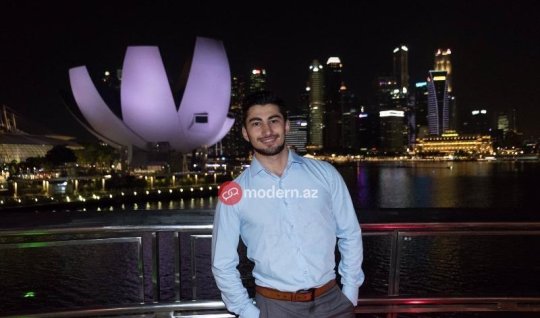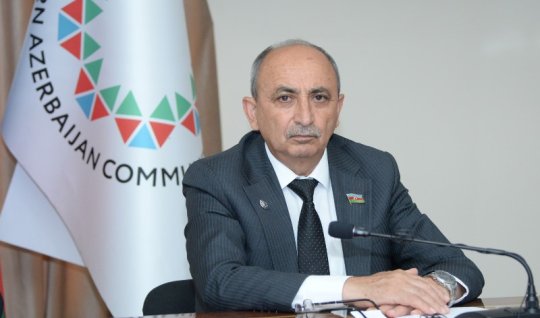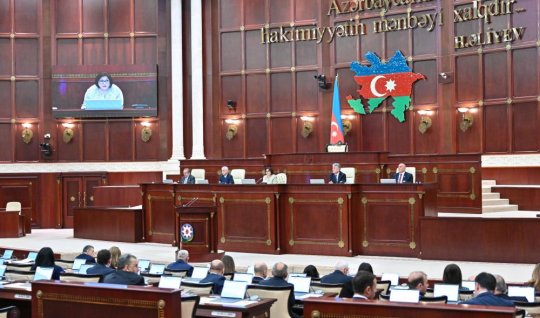Yerevan will demolish the "Armenian genocide" monument? - STATEMENT

Armenia has been conducting international propaganda for years regarding the alleged genocide against Armenians in Anatolia in 1905. Although there is no basis for this, a number of countries have recognized the fabricated "Armenian genocide."
However, after the 44-day war, the Armenian government's stance on the issue has somewhat changed. Armenia has already removed the Mount Ararat symbol from its coat of arms, and Prime Minister Nikol Pashinyan has stated that the "Armenian genocide" issue no longer holds any significance.
For example, Nikol Pashinyan recently commented on Israeli Prime Minister Benjamin Netanyahu's recognition of the "Armenian genocide." He stated at a government briefing on August 28 that Netanyahu's statement has no connection with the interests of the Republic of Armenia or the Armenian nation.
“We must ask ourselves: Do we want the recognition or non-recognition of the Armenian genocide to become an object of geopolitical bargaining in the hands of others, having no connection with our reality, the interests of our state, and the interests of our people? Do we want the genocide to turn into a mere phrase uttered accidentally or due to confusion in some interview? I do not want to put our martyrs in such a situation. I repeat, we must focus our attention on the interests of our state", - he said.
In the next stage, the demolition of the fabricated "genocide monument" in Yerevan may come onto the agenda.
Shamil Ayrım, a deputy from the ruling Justice and Development Party of the Grand National Assembly of Turkey, told Modern.az that Armenia has been working on the "genocide" issue in the international arena for years:
“Unfortunately, the parliaments of several countries have recognized the “Armenian genocide.” The "Armenian genocide" has been accepted in many parts of the world. However, the historical reality is not like this. This can be seen in our sources and in what our elders have said. On the contrary, it is stated that Armenians were the ones who carried out the genocide. There are mass graves in Kars.
It is important for Armenia to keep this issue on the agenda and question it. Because the opening of the Turkey-Armenia borders, linked to the normalization process with Azerbaijan, is now a matter of time. If they reach an agreement with Azerbaijan, our borders with Armenia will open, and trade will begin. These borders will not remain closed forever; they will open one day. Armenia must come to its senses and understand that it needs its border neighbors, Azerbaijan and Turkey, for the welfare and economic development of its people.”

Sh. Ayrım emphasized that the public must be educated for the future demolition of the “Armenian genocide” monument:
“Because there is serious nationalism in Armenian society. For years, they spread propaganda like "Turks massacred us, committed genocide." The truth of the matter needs to be explained to the new generation, to the youth. Not everything can be resolved at once. I believe that as time progresses, such issues will find their resolution. The region needs peace.”
Musa Guliyev, Chairman of the Milli Majlis Committee, said that time is needed for the demolition of the infamous monument in Yerevan:
"It is not even possible to think about it now. If he were to make such a move, they would hang Pashinyan himself from that monument. The demolition of that monument does not seem realistic at this moment and is not expected in the coming years. They have poisoned the minds of that nation with an ideology of enmity towards Turks to such an extent that they perhaps consider that place a sacred oath site. However, in any case, after a peace agreement is signed, political and economic relations will be formed. If the next few generations are not exposed to such propaganda, relations will improve after certain periods. This requires several generational changes. Our grandparents, who witnessed the horrors of the 1918 genocide, did not accept Armenians, calling them unclean and infidels. Subsequent generations raised under Soviet education, especially those living outside Azerbaijan and Armenia, had established normal relations. There are no peoples who are eternal enemies of each other; this is not even possible. To eliminate enmity, years of effort must be made, and certain acknowledgments must be present in relations."

The committee chairman emphasized that the genocides committed against the Azerbaijani people, especially the Khojaly massacre, cannot be forgotten:
"Some of the individuals involved in the Khojaly genocide are currently being tried in Baku, and others will be apprehended and tried in the future. Such legal actions may lead to a softening of events. Certain periods and generations must change. For this, a peace agreement must be signed, and economic and political ties must be established. After this, the gradual normalization of humanitarian and cultural relations will depend on time."
-
17:05, Bu günIs the attack on our embassy a coincidence? - From MPs REACTION
-
16:37, Bu günMoscow disregarded the warning – Baku response AWAITS
-
16:35, Bu günZelensky spoke with Ilham Aliyev
-
15:39, Bu günIf this reform is implemented incorrectly... - WARNING from an ex-deputy regarding the minister's proposal
-
14:44, Bu günThe referee for the Azerbaijan - France match has been announced
-
14:38, Bu günNegotiations are underway regarding the signing of a final peace agreement - MİRZOYAN
-
14:08, Bu günIsrael another 15 Palestinian bodies to Gaza returned
-
13:27, Bu günWhich territories will the “Trump route” pass through? - DETAILS
-
12:40, Bu gün“Napoli” - “Qarabağ” match tickets on sale - PRICE
-
12:26, Bu günThe return of Arayik and others is not on Pashinyan's agenda - MP
-
12:25, Bu günIn Azerbaijan, 70-90 thousand Akhaltsikhe Turks LIVE
-
12:00, Bu günPashinyan some details of the Copenhagen talks with Aliyev REVEALED
-
11:52, Bu gün"Trump route" will be leased for either 49 or 99 years - Pashinyan
-
11:42, Bu günFormer Prime Minister's residence was confiscated
-
10:41, Bu günA company related to the Zangazur corridor IS BEING ESTABLISHED
-
10:17, Bu günAgricultural targets will not be achieved - Chamber of Accounts
-
09:30, Bu günThe US is not against Turkey's role in the South Caucasus
-
09:23, Bu gün29 national teams have qualified for World Cup 2026 - LIST
-
09:17, Bu günWho will host COP31?
-
08:52, Bu günBBC apologized to Trump
-
08:36, Bu günLeaders of 6 countries gather – Ilham Aliyev was also invited
-
00:47, Bu günLet the ancient Turkic oath be read in the Parliament!
-
00:33, Bu günThe Secretary-General of the CSTO was placed on the “black list”
-
00:17, Bu günDisrespect from Greece to Turkey
-
13 November 2025, 23:58Cease military aid to Kyiv!
-
13 November 2025, 23:24Harsh words from Pashinyan to former leaders
-
13 November 2025, 22:39The Cyprus issue is Turkey's national priority - Erdoğan
-
13 November 2025, 22:24Another aircraft incident in Turkey – no word from the pilot
-
13 November 2025, 21:25Russia's 40 million dollar fighter jet crashed - FATALITIES REPORTED
-
13 November 2025, 20:41Bashar al-Assad's close associate was a MOSSAD agent
























































